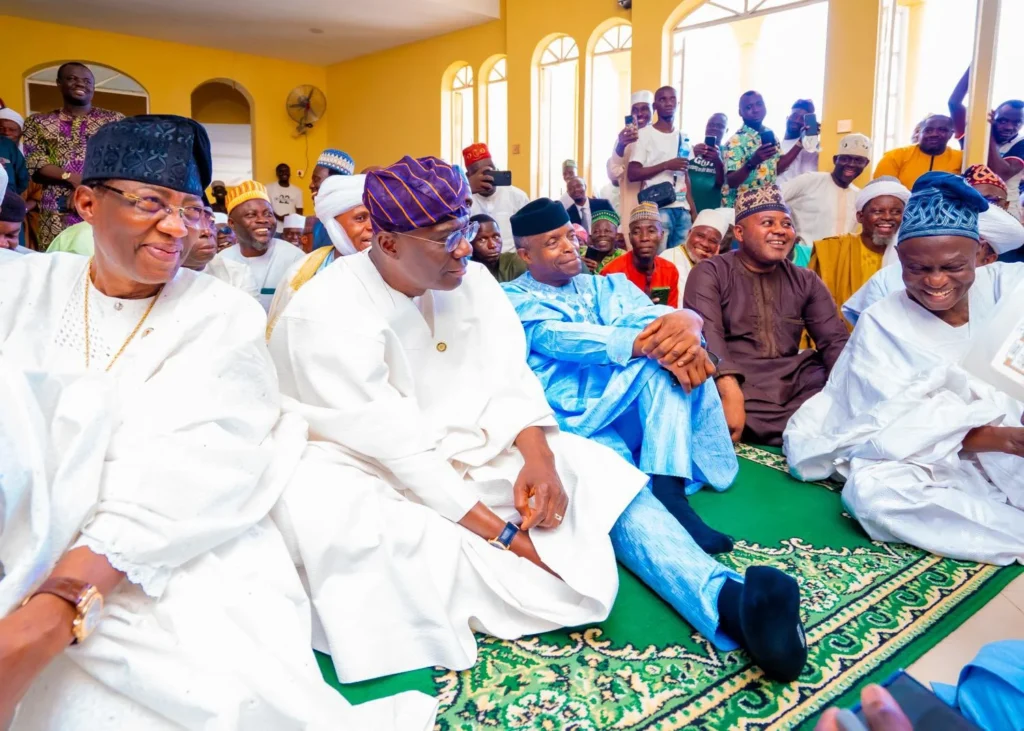In the ancient town of Ijebu-Ode, Ogun State, a chapter of history closed with profound dignity and tradition. Oba Sikiru Kayode Adetona, the Awujale of Ijebu, who ruled for over six decades, was laid to rest in a ceremony that brought together the sacred and the solemn, the past and the present. As his queens gathered to pay their final respects, the weight of tradition filled the air, reminding everyone present that some things in Nigeria remain unchanged, even as the world around them transforms.
The End of an Era
The death of a traditional ruler is never just about one person—it is about the end of an era, the closing of a book that has been written over decades. The Awujale’s tradition was one of wisdom, patience, and deep connection to his people. For 65 years, he had been more than a king; he had been a father, a guide, and a symbol of continuity in a rapidly changing world.
His funeral was not just a goodbye; it was a celebration of a life lived in service to tradition and to the people of Ijebu land. The ceremony followed ancient customs that have been passed down through generations, customs that speak to the deep roots of Yoruba culture and the enduring power of traditional authority.

The Queens’ Final Tribute
Perhaps the most moving aspect of the funeral was the presence of his queens, women who had stood by his side through decades of leadership. Their grief was palpable, but so was their grace. Dressed in traditional attire that honored both their royal status and their mourning, they represented the intimate side of royal life that the public rarely sees.
These women had been his partners in the complex work of traditional leadership, supporting him through the challenges of modern governance while maintaining the tradition that gave their roles meaning. Their presence at the funeral was a reminder that traditional leadership is not a solitary burden but a shared responsibility.
“The Awujale was not just our king; he was our father, our teacher, and our guide. His tradition of wisdom and kindness will live on in our hearts and in the hearts of all Ijebu people.”
— One of the royal mourners
The Weight of Tradition
What made this funeral particularly significant was how it demonstrated the enduring power of tradition in contemporary Nigeria. In a country where modernity often seems to be in conflict with traditional values, the Awujale’s burial showed that the two can coexist with dignity and mutual respect.
The ceremony was conducted according to ancient customs, yet it accommodated modern realities. Government officials sat alongside traditional chiefs, young people recorded the proceedings on their phones while elderly drummers played songs that have been sung for centuries. This blending of old and new was perhaps the most fitting tribute to a ruler who had successfully navigated the challenges of leading a traditional kingdom in the modern world.
Beyond the Pageantry
While the funeral was rich in ceremony and tradition, it was also a moment for reflection on what traditional leadership means in Nigeria today. The Awujale had been more than a ceremonial figure; he had been an active participant in the governance of his people, a bridge between the past and the future, and a voice for continuity in times of change.
His tradition was not just about maintaining old customs; it was about adapting those customs to serve the needs of contemporary society. He had shown that traditional rulers could be relevant and effective in modern Nigeria, not by abandoning their heritage but by finding ways to make that heritage serve the present.

The Continuing Legacy
As the funeral concluded and the Awujale was laid to rest, the question that lingered was not just who would succeed him, but what kind of tradition would continue. Traditional leadership in Nigeria is at a crossroads, challenged by modern governance structures, urbanization, and changing social values.
The Awujale’s funeral was a reminder that tradition is not a museum piece; it is a living force that must evolve to remain relevant. His success as a ruler lay not in his ability to preserve the past unchanged, but in his skill at making the past serve the present and the future.
A Model for Modern Traditional Leadership
The ceremony also highlighted what makes traditional leadership unique in Nigeria. Unlike political leaders who serve for fixed terms, traditional rulers embody continuity. They are links to the past, guardians of culture, and symbols of identity that transcend political boundaries.
The Awujale’s tradition of leadership was characterized by accessibility, wisdom, and genuine care for his people. He had shown that traditional authority could be both respected and respectable, both ancient and contemporary. His funeral was a testament to the possibility of tradition that serves rather than constrains.
The Broader Implications
The death of the Awujale and the tradition surrounding his burial also raise important questions about the future of traditional leadership in Nigeria. As the country continues to develop politically and economically, what role will traditional rulers play? How can they maintain their relevance while honoring their heritage?
The answer, suggested by the Awujale’s life and death, lies in understanding that tradition is not about resistance to change but about providing stability and continuity through change. Traditional leaders who understand this—who can honor the past while embracing the future—will continue to play vital roles in Nigerian society.
Conclusion
The Awujale of Ijebu has been laid to rest, but his tradition lives on. His funeral was not just a goodbye to a beloved ruler; it was a celebration of the enduring power of traditional leadership and cultural continuity. As his queens and subjects paid their final respects, they were not just mourning a loss; they were affirming their commitment to the values and tradition he represented.
In a rapidly changing Nigeria, the Awujale’s legacy serves as a reminder that some things—wisdom, service, and genuine care for one’s people—never go out of style. His tradition will continue to inspire future generations of leaders, both traditional and modern, to serve with dignity, wisdom, and love for their people.
Stay woke. Stay tuned. Stay with AKEWE NEWS.